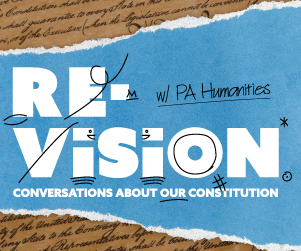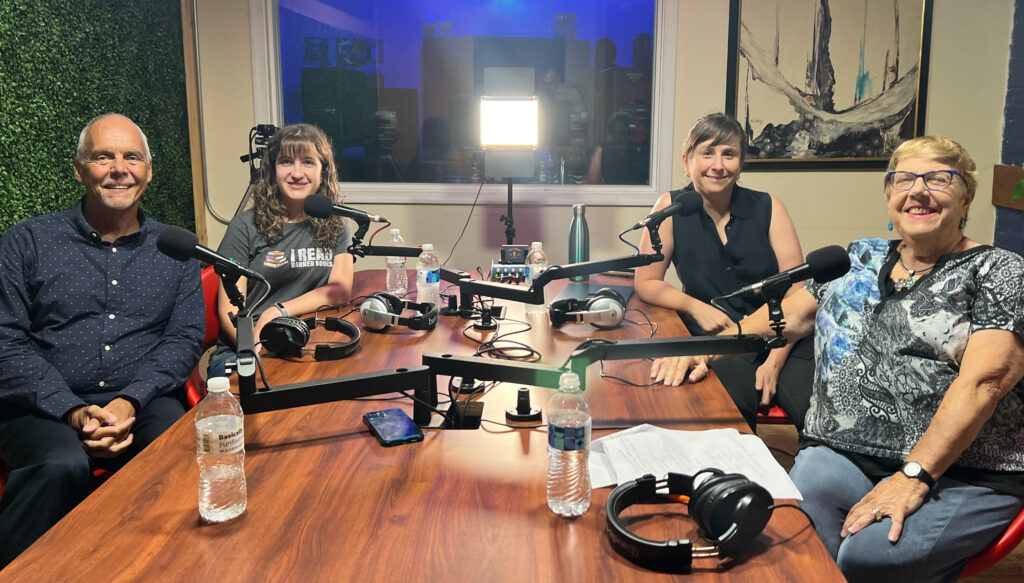In August, a law professor, a nonprofit leader, a formerly-incarcerated young artist, and a podcast host sat around a table in North Philadelphia to talk about the Sixth Amendment, and the U.S. Constitution writ large.
 “I’ll say that I think it’s important for young people to have honest conversations about the Constitution,” said Zamir Ben-Dan, a law professor at Temple University. “A lot of what I know now, with regards to the Constitution and its relationship to slavery, I did not learn in public school. I didn’t even learn it in college. I didn’t even learn it in law school. I literally learned it on my own. And when I learned all of the things that I now know, it connects a lot of dots, and it makes a lot of sense in terms of what has happened in this country. Having a more honest conversation about the Constitution can allow those who were not intended to be included to be included — and to work towards having a better society than what we have now.”
“I’ll say that I think it’s important for young people to have honest conversations about the Constitution,” said Zamir Ben-Dan, a law professor at Temple University. “A lot of what I know now, with regards to the Constitution and its relationship to slavery, I did not learn in public school. I didn’t even learn it in college. I didn’t even learn it in law school. I literally learned it on my own. And when I learned all of the things that I now know, it connects a lot of dots, and it makes a lot of sense in terms of what has happened in this country. Having a more honest conversation about the Constitution can allow those who were not intended to be included to be included — and to work towards having a better society than what we have now.”
Challenge accepted. PA Humanities has launched Re-vision, a new podcast released in conjunction with Constitution Day, which is coming up on September 17. Each installment of the 4-episode series focuses on a different amendment, exploring what some of the founders’ revolutionary ideas — like freedom of speech and the right to a speedy trial — look like today. The podcast brings together scholars, practitioners and young people to discuss the meaning and intentions of our nation’s bedrock document. PA Humanities brought in Keystone Edge Editor in Chief Lee Stabert to host.
The inspiration for Re-vision came from an earlier program, “If You Were In the Room.” For that initiative, PA Humanities asked young people to submit videos articulating what they would have done if they had been there during the Constitutional Convention. The name of the program was a reference to a song in the musical Hamilton. Top submissions earned their creators a trip to see the show on Broadway — and a talk-back session with the cast — as well as a private tour of The National Constitution Center in Old City, Philadelphia.
Having a more honest conversation about the Constitution can allow those who were not intended to be included to be included — and to work towards having a better society than what we have now.Zamir Ben-Dan, Temple Law School
One of the participants was Anna Skeels, who also appears as a guest on episode four of Re-vision.
“There was a quote that she said after she saw Hamilton that stuck with me,” recalls Dawn Frisby-Byers, Senior Director of Content and Engagement for PA Humanities. “She said that the Constitution was written for America then and what we need to do is look at America now. I never forgot it.”
“And when we were coming up with this program, that is what I based it on: America then versus America now,” she adds. “This project looks at why certain things in the Constitution were included from the scholars point of view, and what the current reality is from the practitioners point of view.”
The episodes cover the first, second, sixth and 14th Amendments. The guests range from a high school student who started a banned book club at her high school to a law professor who is also a former public defender, from a young playwright to a Philadelphia City Councilperson. The conversations touch on tough topics such as gun control, social media hate speech, mass incarceration, and slavery.

Here is a short, edited excerpt from the first episode, which covered the first amendment and the current controversy over book bans. You can listen to the entire thing here.
Host: Hearing you speak about the books that have been controversial at your school, one thing that really interests me is the new forefront of gender expression and gender expression as a form of speech. Is being able to dress how you want and play with gender in your external appearance a type of speech?
Joslyn Diffenbaugh (high school student and activist): I would say that you’re expressing yourself. So I definitely would say that it’s speech, especially when you get into pronouns and preferred names. I definitely say that’s something that does involve the First Amendment and freedom of speech. If a person tells me that they want to go by different pronouns or if they want to go by a different name, I’m going to address them that way.
I definitely think that freedom of speech does involve expressing yourself through clothes, your name, through pronouns, because it’s yourself. I also think our generation is kind of wiping away some of your gender stereotypes.

John Culhane (Professor of Law at Widener University): You know, the Supreme Court has said that students, particularly as they get closer to adulthood in high school, have First Amendment rights. You don’t have to wait until you’re 18 to acquire your First Amendment rights, but there’s also the competing interest of the school in keeping a an “orderly environment.”
And so it depends on who’s on the Supreme Court and how they balance those interests. But certainly, for someone to be able to dress the way they want would be considered expressive conduct — which is considered to be speech by the Supreme Court. And particularly pronouns, that is definitely speech. It’s hard for me to see how someone choosing to use the pronoun “they,” for instance, is going to disrupt the orderly conduct of the high school.
The problem is that litigating all of these things takes time and money. We have the ACLU (American Civil Liberties Union) to do a lot of that good work, but you have to fight all of these things as they come up. Right now there are so many challenges in different states to trans issues, and to gender identity and expression, and to book banning that it’s hard to know where to begin.
There have been some successes already. You know, this idea that you can ban drag shows — what is that? Courts have already struck down some of those laws. So I think we’re seeing positive responses. But these things take a while. And right now, as [fellow guest] Elaine Maimon said earlier, we’re in a crucial moment, I think, in American history.
To learn more about this program, visit PAhumanities.org/revision. The site features links that will make it super easy to subscribe wherever you listen to podcasts.
LEAD IMAGE: Recording Re-vision Episode 4 at Philly Podcast Studio; from left to right Anna Skeels, Tayyib Smith, Lee Stabert and Donald Harris.
Re-vision has been made possible by the National Endowment for the Humanities as part of the A More Perfect Union initiative.” That special initiative is designed to demonstrate and enhance the critical role the humanities play in our nation, while also supporting projects that will help Americans commemorate the 250th anniversary of the Declaration of Independence in 2026. The initiative builds on NEH’s investment over the past six decades in projects that catalog, preserve, explain, and promote American history.



